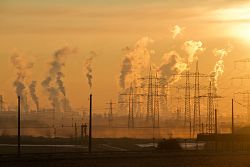

The UK Government says there will be a new target to protect people from the effects of breathing in tiny particles produced by transport and industry.
The country falls short of the limit recommended by the World Health Organization (WHO) for tiny particles, called PM 2.5. They are produced by burning fuels in power generation, domestic heating and in vehicle engines, and are known to harm the lungs and heart.
Ministers will confirm a legally binding PM 2.5 target in two years time, with goals for waste reduction, wildlife and water. This follows criticism that the Government's 2020 Environment Bill failed to include binding targets.
The proposed targets have received mixed views, with some green groups unable to tell whether they will be strong enough to tackle the current ecological crisis, and others expressing concern that the targets won't be settled until 2022.
The Government's new goals will commit to restoring and creating habitats rich with wildlife in protected sites, and tackling pollution agriculture and waste water to improve water quality.
They have also announced a new environmental watchdog, the Office for Environmental Protection, who will monitor the annual progress. It is hoped that setting targets will have the same effect on the broader environment that they've had on cutting carbon emissions.
Environment Secretary George Eustice said: “The targets we set will be the driving force behind our bold action to protect and enhance our natural world - guaranteeing lasting progress on some of the biggest environmental issues".
"I hope these targets will provide some much-needed certainty to businesses and society".
The announcement has already generated debate on where the targets should be applied and how strong they should be.
Richard Benwell from Wildlife and Countryside Link, said: "These proposals show the Government is considering a truly bold breadth of targets for Nature - well beyond the statutory minimum".
"Nevertheless, more ambition will be needed to turn round the relentless decline in our natural world".